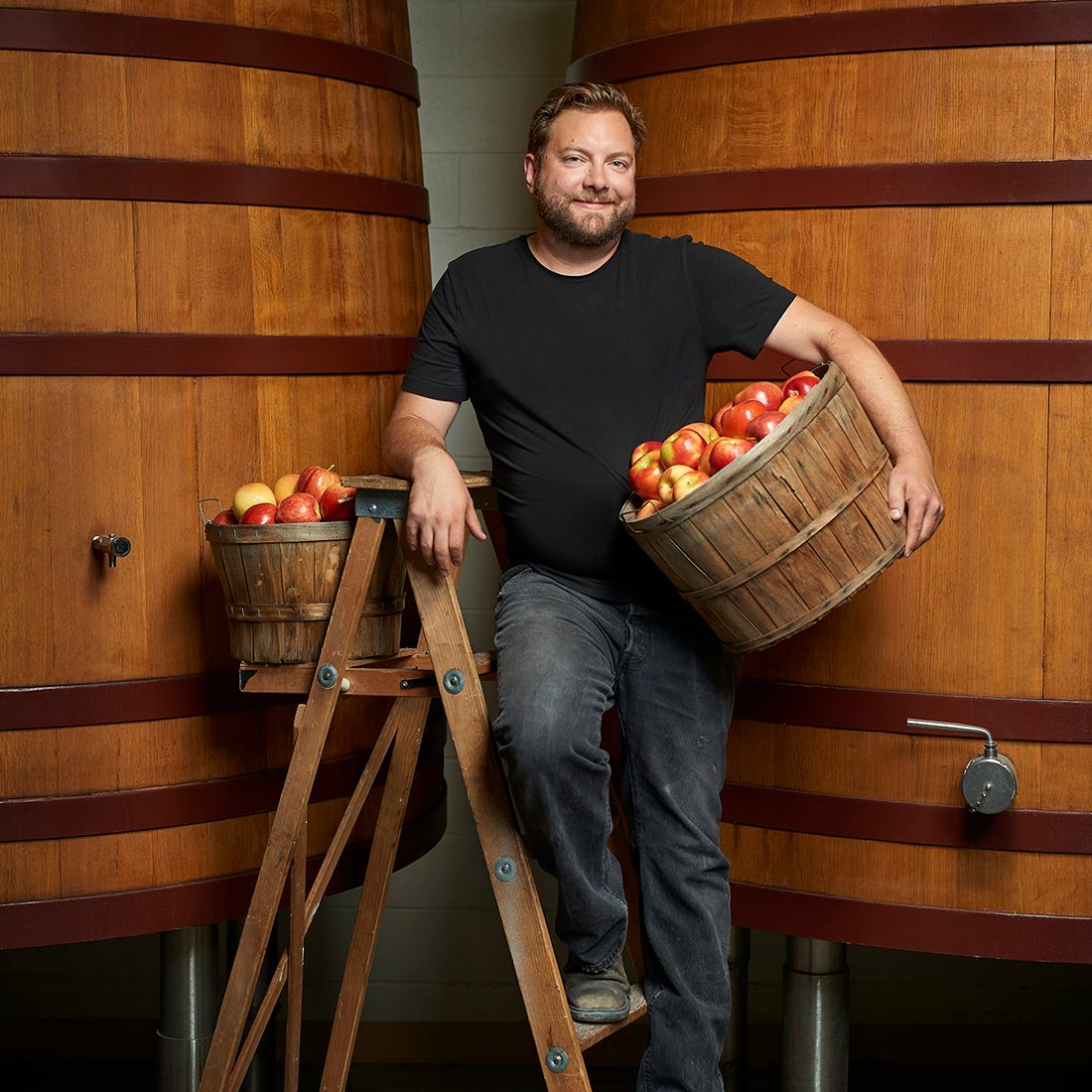Calgary Cider Maker Brodie Thomas Is on a Mission to Use Every Apple in the City
With Uncommon Cider, founder Brodie Thomas collects apples that have fallen from trees, and gives money to local charities from his sales.

No Bad Apples
There were boxes of apples stacked upon boxes of apples, and milk crates and plastic bins and brown paper bags of apples, too. Calgary cider maker Brodie Thomas had lost track of how many containers had arrived. It was enough to cover the floor of a 222-square metre warehouse, leaving a corridor wide enough for only one human and a dog—Bramley, named for a variety of apple—to squeeze through.
Thomas sat in a chair, taking it all in, worrying his dream would turn to rot in front of his eyes. “I thought, ‘Oh my god, what have I done?’”
The dream he speaks of started more than a decade ago when Thomas was living in England and working in food policy. There, he fell in love with the very British tradition of drinking cider and came up with an idea. When he returned to Canada, he’d start a cidery, one that reflects his philosophy on food production: be local, waste conscious and socially responsible.
In 2015, Thomas launched Uncommon Cider in Calgary, the province’s first cidery. (The company uses apples from British Columbia and berries from Alberta.) Two years after bottling his first batch, he announced a local fruit drive to make a cider as homegrown as possible. Thomas and his crew of volunteers offered to come to anyone’s home in Calgary and pick unwanted fruit from their trees. They planned to press and ferment the fruits into a cider, with some proceeds going to charities.
Calgary is a city known for oil and gas companies, but anyone who lives there can attest that, come late summer, its sidewalks are splattered with fallen fruit. That’s true even in new neighbourhoods where developers plant crabapple trees in abundance for their pretty pink, red and white blossoms.
When residents called Uncommon Cider to donate fruit, Thomas drove his Volkswagen hatchback to their home, his ladder hanging out the back. In 2017, he collected nearly 1,500 pounds of donated fruit, which he estimates will produce about 1,100 litres of cider.
The next summer, Uncommon Cider’s fruit drive exploded in popularity. Within a few days, 400 people offered their trees for picking. Overwhelmed by the response, Thomas set up drop off spots around the city where people could leave their fruit. He borrowed vans from other local breweries to collect the donations and relied on volunteers to help.
And that is how he found himself staring at approximately 23,000 kilograms of fruit in his warehouse, hoping to process it into juice before anything spoiled. “That was the most heartbreaking time. All these people donated this fruit, and I just didn’t feel like I had enough hours in the day.” In the end, Uncommon Cider succeeded in making more than 10,000 litres of juice from both fruit drives.
It takes a year or longer to press fruits into juice and then ferment it into cider, says Thomas. Due to a high proportion of crabapples (which take longer to ferment) in the 2017 batch, it won’t be ready to sell until this Spring—and he plans to donate 10 per cent of proceeds from that year’s cider to Inn From the Cold, a charity supporting the homeless.
Meanwhile, the 2018 batch was ready sooner, and went on sale when Uncommon Cider’s first taproom opened in August 2019. A few months after that, growlers of the cider became available across Alberta. From that lot, Thomas hopes to donate $10,000 to the Calgary Food Bank over the next year.
“That will have a huge impact,” says Shawna Ogston, spokesperson for the Calgary Food Bank. She adds that, through partnerships with other organizations, the food bank can leverage every dollar donated, into five dollars worth of food. “So $10,000 goes a long, long way.”
Eventually, Thomas hopes to set up an Uncommon Cider tool library where people can borrow ladders and buckets for picking their own fruit. He envisions a province-wide fruit drive where people from different neighbourhoods across Alberta contribute fruit for a community cider.
His long-term goal is nothing less than changing the way people think about food waste: “We can be creative and make a lot of things with fruit that’s usually thrown out.”
Next, read the inspiring story of how an Alberta man with autism is inspiring families to rethink what their children can achieve.



